yellow
having the colour of butter or the middle part of an egg

زرد
She was dressed in yellow.
او لباس زرد پوشیده بود.
having the colour of butter or the middle part of an egg

زرد
She was dressed in yellow.
او لباس زرد پوشیده بود.
having the colour of butter or the middle part of an egg

زرد
She was dressed in yellow.
او لباس زرد پوشیده بود.
having the colour of butter or the middle part of an egg

زرد
She was dressed in yellow.
او لباس زرد پوشیده بود.
yellow
adjective
with the colour of a lemon or of butter:
She was wearing a yellow shirt.
yellow
I. yel‧low1 S2 W3 /ˈjeləʊ $ -loʊ/ BrE AmE adjective
[Language: Old English; Origin: geolu]
1. having the colour of butter or the middle part of an egg:
yellow flowers ⇨ ↑chrome yellow, ⇨ lemon yellow at ↑lemon2, ⇨ primrose yellow at ↑primrose(2)
2. not polite an offensive way of describing the skin colour of people from parts of Asia
3. (also yellow-bellied) informal not brave SYN cowardly
yellow
yel·low [yellow yellows yellowed yellowing yellower yellowest] adjective, noun, verb [ˈjeləʊ] [ˈjeloʊ]
adjective (yel·lower, yel·lowest)
1. having the colour of lemons or butter
• pale yellow flowers
• a bright yellow waterproof jacket
2. (taboo) an offensive word used to describe the light brown skin of people from some E Asian countries
3. (informal, disapproving) easily frightened
Syn: cowardly
Word Origin:
Old English geolu, geolo, of West Germanic origin; related to Dutch geel and German gelb, also to gold.
Example Bank:
• Her teeth were rather yellow.
• She wore a pale yellow dress.
Derived Word: yellowness
noun uncountable, countable
the colour of lemons or butter
• She was dressed in yellow.
• the reds and yellows of the trees
Word Origin:
Old English geolu, geolo, of West Germanic origin; related to Dutch geel and German gelb, also to gold.
Cambridge Advanced Learner's Dictionary - 4th Edition
yellow / ˈjel.əʊ / / -oʊ / adjective (COLOUR)
A1 of a colour like that of a lemon or gold or the sun:
a bright yellow flower/T-shirt
© Cambridge University Press 2013
yellow
/jeloʊ/
(yellows, yellowing, yellowed)
Frequency: The word is one of the 700 most common words in English.
1.
Something that is yellow is the colour of lemons, butter, or the middle part of an egg.
The walls have been painted bright yellow...
COLOUR
2.
If something yellows, it becomes yellow in colour, often because it is old.
The flesh of his cheeks seemed to have yellowed...
She sat scanning the yellowing pages.
VERB: V, V-ing
1yel·low /ˈjɛloʊ/ adj yel·low·er; -est [or more ~; most ~]
1 : having the color of the sun or of ripe lemons
• a yellow car
• The raincoat was yellow.
2 informal : afraid in a way that makes you unable to do what is right or expected : cowardly
• He was too yellow to stand up and fight.
3 always used before a noun : containing news that is meant to shock people and that is not true or is only partly true
• yellow journalism
a colour that is between red and yellow
نارنجی
an orange shirt
پیراهن نارنجی
a colour that is between red and yellow
نارنجی
an orange shirt
پیراهن نارنجی
orange
adjective
with a colour that is between red and yellow:
orange paint
2. [uncountable] a colour that is between red and yellow:
a bright shade of orange
—orange adjective:
an orange shirt
adjective
1. bright reddish-yellow in colour
• yellow and orange flames
• There was a warm orange glow in the sky.
Cambridge Advanced Learner's Dictionary - 4th Edition
orange / ˈɒr.ɪndʒ / / ˈɔːr- / adjective
A1 of a colour between red and yellow:
The setting sun filled the sky with a deep orange glow.
orangeness / -nəs / noun [ U ]
© Cambridge University Press 2013
orange
/ɒrɪndʒ, AM ɔ:r-/
(oranges)
Frequency: The word is one of the 1500 most common words in English.
1.
Something that is orange is of a colour between red and yellow.
...men in bright orange uniforms.
COLOUR
2.
An orange is a round juicy fruit with a thick, orange coloured skin.
...orange trees.
...fresh orange juice.
N-VAR: oft N n
3.
Orange is a drink that is made from or tastes of oranges.
...vodka and orange.
N-UNCOUNT
2 : a color between red and yellow that is like the color of fire and carrots - see color picture
compare apples and/to/with oranges
- see 1compare
- orange adj
• an orange flame
• He was wearing an orange shirt.
- or·ang·ish /ˈɑrɪnʤɪʃ, ˈorɪnʤɪʃ/ adj
• the cat's orangish fur
the colour of dark clouds, neither black nor white

خاکستری، طوسی
gray hair
موهای خاکستری
the colour of dark clouds, neither black nor white

خاکستری، طوسی
gray hair
موهای خاکستری
1gray US or chiefly Brit grey /ˈgreɪ/ adj gray·er; -est
1 : having a color between black and white : having a color that is like the color of smoke
• a gray sweater/suit
• gray hair
2 : having gray hair
• What will you do when you are old and gray?
• My friends have all gone gray.
3 : lacking brightness: such as
a : cloudy and dark
• It was a gray winter day.
• a cold, gray dawn
b : very boring or ordinary
• leading a gray existence
c : having or showing little life or energy
• the gray faces of the people in the crowd
- gray·ness US or chiefly Brit grey·ness noun [noncount]
• the grayness of the dawn
gray
I. gray /ɡreɪ/ BrE AmE
the usual American spelling of ↑grey
II. grey2 BrE AmE British English, gray American English noun
[uncountable and countable] the colour of dark clouds, neither black nor white:
Do you have these skirts in grey?
dull greys and browns
III. grey3 BrE AmE British English, gray American English verb
[intransitive] if someone greys, their hair becomes grey:
Jim was greying a little at the temples.
a full head of greying hair
grey
grey [grey greys greyed greying greyer greyest] (especially BrE) (NAmE usually gray) adjective, noun, verb [ɡreɪ] [ɡreɪ]
adjective
1. having the colour of smoke or ashes
• grey eyes/hair
• wisps of grey smoke
• a grey suit
2. not usually before noun having grey hair
• He's gone very grey.
3. (of the sky or weather) dull; full of clouds
• grey skies
• I hate these grey days.
4. (of a person's skin colour) pale and dull, because they are ill/sick, tired or sad
• The next morning she looked very grey and hollow-eyed.
5. without interest or variety; making you feel sad
• Life seems grey and pointless without him.
6. (disapproving) not interesting or attractive
• The company was full of faceless grey men who all looked the same.
7. only before noun connected with old people
• the grey vote
• grey power
Word Origin:
Old English grǣg, of Germanic origin; related to Dutch grauw and German grau.
Example Bank:
• She was completely grey by the age of thirty.
• The sky looks very grey. I think it's going to rain.
• a light grey suit
• He'd turned quite grey.
• The old man's beard was mostly grey.
• His face was grey with pain.
• It is thought of as a city of grey bureaucracy.
• Ours is a company that isn't run by grey men in suits.
• She had to talk to some grey under-secretary from the Ministry.
Derived Word: greyness
noun
1. uncountable, countable the colour of smoke or ashes
• the dull grey of the sky
• dressed in grey
2. countable a grey or white horse
• She's riding the grey.
Word Origin:
Old English grǣg, of Germanic origin; related to Dutch grauw and German grau.
verb intransitive (of hair)
to become grey
• His hair was greying at the sides.
• a tall woman with greying hair
Word Origin:
Old English grǣg, of Germanic origin; related to Dutch grauw and German grau.
Cambridge Advanced Learner's Dictionary - 4th Edition
grey ( US usually gray ) / ɡreɪ / adjective (COLOUR)
A1 of the colour that is a mixture of black and white, the colour of rain clouds:
a grey sky
C2 having hair that has become grey or white, usually because of age:
He started to go/turn grey in his mid-forties.
B2 describes the weather when there are a lot of clouds and little light:
Night turned into morning, grey and cold.
greyness ( US usually grayness ) / ˈɡreɪ.nəs / noun [ U ]
grey ( US usually gray ) / ɡreɪ / adjective (BORING)
C1 boring and sad:
He saw a grey future stretch ahead of him.
greyness ( US usually grayness ) / ˈɡreɪ.nəs / noun [ U ]
© Cambridge University Press 2013
grey
/greɪ/
(greyer, greyest)
Frequency: The word is one of the 1500 most common words in English.
Note: in AM, use 'gray'
1.
Grey is the colour of ashes or of clouds on a rainy day.
...a grey suit.
COLOUR
2.
You use grey to describe the colour of people’s hair when it changes from its original colour, usually as they get old.
...my grey hair...
Eddie was going grey.
ADJ
3.
If the weather is grey, there are many clouds in the sky and the light is dull.
It was a grey, wet April Sunday.
ADJ
• grey‧ness
...winter’s greyness.
N-UNCOUNT
4.
If you describe a situation as grey, you mean that it is dull, unpleasant, or difficult.
Brazilians look gloomily forward to a New Year that even the president admits will be grey and cheerless.
= bleak
ADJ
• grey‧ness
In this new world of greyness there is an attempt to remove all risks.
N-UNCOUNT
5.
If you describe someone or something as grey, you think that they are boring and unattractive, and very similar to other things or other people.
...little grey men in suits.
ADJ [disapproval]
• grey‧ness
Journalists are frustrated by his apparent greyness.
N-UNCOUNT: with supp
6.
Journalists sometimes use grey to describe things concerning old people.
There was further evidence of grey consumer power last week, when Ford revealed a car designed with elderly people in mind.
ADJ
1gray US or chiefly Brit grey /ˈgreɪ/ adj gray·er; -est
1 : having a color between black and white : having a color that is like the color of smoke
• a gray sweater/suit
• gray hair
2 : having gray hair
• What will you do when you are old and gray?
• My friends have all gone gray.
3 : lacking brightness: such as
a : cloudy and dark
• It was a gray winter day.
• a cold, gray dawn
b : very boring or ordinary
• leading a gray existence
c : having or showing little life or energy
• the gray faces of the people in the crowd
- gray·ness US or chiefly Brit grey·ness noun [noncount]
• the grayness of the dawn
having the darkest colour, like coal or night
سیاه، مشکی
a black and white photo
عکس سیاه و سفید
having the darkest colour, like coal or night

سیاه، مشکی
a black and white photo
عکس سیاه و سفید
adjective (blacker, blackest)
1 with the colour of the sky at night:
a black dog
2 belonging to a race of people with dark skins:
Martin Luther King was a famous black leader.
3 without milk:
black coffee
black
I. black1 S1 W1 /blæk/ BrE AmE adjective (comparative blacker, superlative blackest)
[Language: Old English; Origin: blæc]
1. COLOUR having the darkest colour, like coal or night:
a black evening dress
jet/inky black (=very dark)
jet black hair
2. NO LIGHT very dark because there is no light:
It was still pitch black (=very dark) out.
3. PEOPLE (also Black)
a) belonging to the race of people who originally came from Africa and who have dark brown skin ⇨ white:
Over half the students are black.
b) [only before noun] relating to black people:
politics from a black perspective
Black and Asian music
4. DRINK [only before noun] black coffee or tea does not have milk in it OPP white:
Black coffee, no sugar, please.
5. DIRTY informal very dirty
be black with soot/dirt/age etc
6. WITHOUT HOPE sad and without hope for the future:
the blackest period of European history
a mood of black despair
It’s been another black day for the car industry, with more job losses announced.
7. HUMOUR making jokes about serious subjects, especially death:
a very black joke
8. ANGRY [only before noun] full of feelings of anger or hate ⇨ blackly:
Denise gave me a black look.
9. a black mark (against somebody) if there is a black mark against you, someone has a bad opinion of you because of something you have done
10. not be as black as you are painted not to be as bad as people say you are
11. BAD literary very bad:
black deeds
black
black [black blacks blacked blacking blacker blackest] adjective, noun, verb [blæk] [blæk]
adjective (black·er, black·est)
COLOUR
1. having the very darkest colour, like night or coal
• a shiny black car
• black storm clouds
WITH NO LIGHT
2. without light; completely dark
• a black night
PEOPLE
3. (also Black) belonging to a race of people who have dark skin; connected with black people
• a black woman writer
• black culture Black is the word most widely used and generally accepted in Britain. In the US the currently accepted term is African American.
TEA/COFFEE
4. without milk
• Two black coffees, please.
compare white
DIRTY
5. very dirty; covered with dirt
• chimneys black with smoke
• Go and wash your hands; they're absolutely black!
ANGRY
6. full of anger or hatred
• She's been in a really black mood all day.
• Rory shot her a black look.
DEPRESSING
7. without hope; very depressing
• The future looks pretty black.
• It's been another black day for the north-east with the announcement of further job losses.
EVIL
8. (literary) evil or immoral
• black deeds/lies
HUMOUR
9. dealing with unpleasant or terrible things, such as murder, in a humorous way
• ‘Good place to bury the bodies,’ she joked with black humour.
• The play is a black comedy.
see also blackly
more at the pot calling the kettle black at pot n.
Word Origin:
Old English blæc, of Germanic origin.
Thesaurus:
black adj.
1.
• It's pitch black outside tonight.
dark • • unlit •
Opp: light
a black/dark night
go black/dark
pitch black/dark
2. (especially BrE)
• a black girl
African American • • non-white • • mixed race • |AmE of color •
black/African American/non-white/mixed race people
people of mixed race/color
black/African American culture
Black or African American? Black is the mostly widely used and accepted term in Britain; a black person from the US is African American. Black can also be used as a noun, but it is only acceptable in the plural. Use the adjective for singular use
• equality for blacks and whites
• a black man/woman
Example Bank:
• It was pitch black outside.
• She had beautiful jet-black hair.
• The sky looks very black.
• His hands were all black from messing with the car.
• He denounced these acts as ‘black deeds‘.
• It's been another black day for the north-east with the announcement of further job losses.
• My head banged on a rock and everything went black.
• The future looks pretty black, I'm afraid.
• The wind and rain intensified the black darkness outside.
• Through the black night came the sound of thunder.
• a black girl
• a black man/woman
• equality for blacks and whites
Cambridge Advanced Learner's Dictionary - 4th Edition
black / blæk / adjective (COLOUR)
A1 having the darkest colour there is, like the colour of coal or of a very dark night:
black shoes
black / blæk / adjective (PEOPLE)
Black A2 relating or belonging to people with black or dark brown skin, especially people who live in Africa or whose family originally came from Africa:
Black culture
Black Americans
black / blæk / adjective (COFFEE/TEA)
without any milk or cream added:
a cup of strong black coffee
I like my tea black, with sugar.
black / blæk / adjective (BAD)
without hope:
The future looked black.
literary bad or evil:
a black-hearted villain
© Cambridge University Press 2013
black
/blæk/
(blacker, blackest, blacks, blacking, blacked)
Frequency: The word is one of the 700 most common words in English.
1.
Something that is black is of the darkest colour that there is, the colour of the sky at night when there is no light at all.
She was wearing a black coat with a white collar...
He had thick black hair...
I wear a lot of black...
He was dressed all in black.
COLOUR
2.
A black person belongs to a race of people with dark skins, especially a race from Africa.
He worked for the rights of black people...
...the traditions of the black community.
ADJ
3.
Black people are sometimes referred to as blacks. This use could cause offence.
There are about thirty-one million blacks in the US.
N-COUNT: usu pl
4.
Black coffee or tea has no milk or cream added to it.
A cup of black tea or black coffee contains no calories...
I drink coffee black.
ADJ: ADJ n, v n ADJ
5.
If you describe a situation as black, you are emphasizing that it is very bad indeed.
It was, he said later, one of the blackest days of his political career...
The future for the industry looks even blacker.
ADJ [emphasis]
6.
If someone is in a black mood, they feel very miserable and depressed.
Her mood was blacker than ever.
ADJ
7.
Black humour involves jokes about sad or difficult situations.
‘So you can all go over there and get shot,’ he said, with the sort of black humour common among British troops here...
It’s a black comedy of racial prejudice, mistaken identity and thwarted expectations.
ADJ: usu ADJ n
8.
People who believe in black magic believe that it is possible to communicate with evil spirits.
He was also alleged to have conducted black magic ceremonies...
The King was unjustly accused of practising the black arts.
ADJ: ADJ n
9.
If you say that someone is black and blue, you mean that they are badly bruised.
Whenever she refused, he’d beat her black and blue...
Bud’s nose was still black and blue.
PHRASE: usu PHR after v, v-link PHR
10.
If a person or an organization is in the black, they do not owe anyone any money.
Until his finances are in the black I don’t want to get married.
≠ in the red
PHRASE: v-link PHR, PHR after v
11.
If someone gives you a black look, they look at you in a way that shows that they are very angry about something.
Passing my stall, she cast black looks at the amount of stuff still unsold.
PHRASE: N inflects, usu PHR after v
1black /ˈblæk/ adj black·er; -est
1 a : having the very dark color of coal or the night sky
• black ink
• a black dress
b : very dark because there is no light
• a black night
2 or Black : of or relating to a race of people who have dark skin and who come originally from Africa
• black people
• black culture
✦In the U.S., the term African-American is often preferred over black when referring to Americans of African descent.
3 : very dirty
• His hand were black with grime.
4 : served without cream or milk
• black coffee
5 literary : evil or wicked
• a black deed
- see also black art, black magic
6 a : very sad or hopeless : bleak
• The outlook was black.
• When they heard the terrible news, they were filled with black despair.
b : very tragic or unhappy
• That was a black day in our country's history.
7 : marked by anger or hatred
• A black [=very angry] look darkened his face.
• black resentment
• a black mood
8
- used to describe humor that deals with subjects which are usually regarded as very serious or unpleasant
• The film is a black comedy set in a funeral home.
• black humor
- black·ly adv
• a blackly funny/comic/humorous movie
- black·ness noun [noncount]
• the blackness of the night
having the colour of blood

قرمز
She often wears red clothes.
او معمولا لباس قرمز می پوشد.
having the colour of blood

قرمز
She often wears red clothes.
او معمولا لباس قرمز می پوشد.
red
adjective (redder, reddest)
1 having the colour of blood:
She's wearing a bright red dress.
red wine
2 Red hair has a colour between red, orange and brown.
>> red noun:
Lucy was dressed in red.
red
I. red1 S1 W1 /red/ BrE AmE adjective (comparative redder, superlative reddest)
[Language: Old English; Origin: read]
1. COLOUR having the colour of blood:
We painted the door bright red.
a red balloon ⇨ ↑blood-red, ⇨ cherry red at ↑cherry(3), ⇨ ↑scarlet
2. HAIR hair that is red has an orange-brown colour
3. FACE if you go red, your face becomes a bright pink colour, especially because you are embarrassed or angry
go/turn red
Every time you mention his name, she goes bright red.
4. WINE red wine is a red or purple colour ⇨ white
5. like a red rag to a bull British English (also like waving a red flag in front of a bull American English) very likely to make someone angry or upset:
Just mentioning his ex-wife’s name was like a red rag to a bull.
6. roll out the red carpet/give somebody the red carpet treatment to give special treatment to an important visitor
7. not one red cent American English informal used to emphasize that you mean no money at all:
I wouldn’t give him one red cent for that car.
8. POLITICS informal ↑communist or extremely ↑left-wing political views – used to show disapproval
—redness noun [uncountable]
⇨ paint the town red at ↑paint2(5)
red
red [red reds redder reddest] adjective, noun [red] [red]
adjective (red·der, red·dest)
1. having the colour of blood or fire
• a red car
• The lights (= traffic lights) changed to red before I could get across.
2. (of the eyes) bloodshot (= with thin lines of blood in them) or surrounded by red or very pink skin
• Her eyes were red from crying.
3. (of the face) bright red or pink, especially because you are angry, embarrassed or ashamed
• He stammered something and went very red in the face.
• (BrE) She went red as a beetroot.
• (NAmE) She went red as a beet.
4. (of hair or an animal's fur) reddish-brown in colour
• a red-haired girl
• red deer
see also redhead
5. (informal, politics) (sometimes disapproving) having very left-wing political opinions
compare pink
6. (politics) (of an area in the US) having more people who vote for the Republican candidate than the Democratic one
• red states/counties
Opp: blue
more at paint the town red at paint v.
Word Origin:
Old English rēad, of Germanic origin; related to Dutch rood and German rot, from an Indo-European root shared by Latin rufus, ruber, Greek eruthros, and Sanskrit rudhira ‘red’.
Example Bank:
• He could feel himself going bright red.
• Mr Grubb was shouting and growing redder and redder in the face.
• Ross flushed red with embarrassment.
• The coals glowed red in the dying fire.
• The leaves looked slightly red.
• flaming red hair
• her ruby red lips
• Her eyes were red and puffy, as if she'd been crying.
• The traffic light turned red.
Cambridge Advanced Learner's Dictionary - 4th Edition
red / red / adjective ( redder , reddest )
A1 of the colour of fresh blood:
red lipstick
The dress was bright red.
A2 describes hair that is an orange-brown colour go/turn (bright) red B2 If you go/turn red, your face becomes red because you are angry or embarrassed:
Look, you've embarrassed him - he's gone bright red!
If your eyes are red, the white part of your eyes and the skin around your eyes is red, because of crying, tiredness, too much alcohol, etc.
redness / ˈred.nəs / noun [ U ]
Her scar healed, but the redness remained for a long time.
© Cambridge University Press 2013
red
/red/
(reds, redder, reddest)
Frequency: The word is one of the 700 most common words in English.
1.
Something that is red is the colour of blood or fire.
...a bunch of red roses...
COLOUR
2.
If you say that someone’s face is red, you mean that it is redder than its normal colour, because they are embarrassed, angry, or out of breath.
With a bright red face I was forced to admit that I had no real idea...
ADJ
3.
You describe someone’s hair as red when it is between red and brown in colour.
...a girl with red hair...
ADJ
4.
You can refer to red wine as red.
The spicy flavours in these dishes call for reds rather than whites.
N-MASS
5.
If you refer to someone as a red or a Red, you disapprove of the fact that they are a communist, a socialist, or have left-wing ideas. (INFORMAL)
N-COUNT [disapproval]
6.
If a person or company is in the red or if their bank account is in the red, they have spent more money than they have in their account and therefore they owe money to the bank.
The theatre is £500,000 in the red...
PHRASE: v-link PHR
7.
If you see red, you suddenly become very angry.
I didn’t mean to break his nose. I just saw red.
PHRASE: V inflects
red
1red /ˈrɛd/ adj red·der; red·dest [also more ~; most ~]
1 : having the color of blood
• a shiny red fire truck
• bright red shoes
• dark red apples
2 : reddish brown or reddish orange in color
• She has red hair. [=she is a redhead]
• a red fox
3 of a person's face : pink because of embarrassment, anger, etc.
• His face turns red when he gets angry.
• When she realized her mistake, she turned beet red. [=she blushed]
• (Brit) His face went red with embarrassment.
4 of eyes : having many red lines from lack of sleep, drunkenness, etc. : bloodshot
• Her eyes were red from crying.
5 somewhat old-fashioned informal + disapproving : supporting Communism : communist
a red rag to a bull Brit informal : something that makes a person very angry
• Just mentioning his poor marks to him was waving a red rag to a bull.
not one red cent
- see cent
paint the town red
- see 2paint
- red·ness /ˈrɛdnəs/ noun [noncount]
• There was swelling and redness around the site of the bee sting.
COLOUR having the colour of milk, salt, or snow

سفید
a white dress
یک لباس سفید
COLOUR having the colour of milk, salt, or snow

سفید
a white dress
یک لباس سفید
adjective (whiter, whitest)
1 with the colour of snow or milk:
He wore a white shirt and a blue tie.
2 with pale skin
3 (British) White coffee is made with milk:
I'd like a white coffee.
4 White wine is wine with a light colour.
white
I. white1 S1 W1 /waɪt/ BrE AmE adjective
[Word Family: noun: ↑white, ↑whiteness, ↑whitener; verb: ↑whiten; adjective: ↑white]
[Language: Old English; Origin: hwit]
1. COLOUR having the colour of milk, salt, or snow:
a white dress
pure/snow white (=completely white)
snow white hair
2. PEOPLE
a) belonging to the race of people with pale skin ⇨ black:
young white males
b) relating to white people:
a white neighborhood
3. PALE looking pale, because of illness, strong emotion etc:
Are you OK? You’re white as a sheet (=extremely pale).
white with anger/fear etc
Her voice shook, and her face was white with anger.
4. COFFEE [usually before noun] British English white coffee has milk or cream in it
5. WINE white wine is a pale yellow colour ⇨ red
6. a white Christmas a Christmas when there is snow
7. whiter than white completely morally good:
He said that he had never claimed to be whiter than white.
white
white [white whites whited whiting whiter whitest] adjective, noun [waɪt] [waɪt]
adjective (whiter, whit·est)
1. having the colour of fresh snow or of milk
• a crisp white shirt
• white bread
• a set of perfect white teeth
• His hair was as white as snow.
• The horse was almost pure white in colour.
2. belonging to or connected with a race of people who have pale skin
• white middle-class families
• She writes about her experiences as a black girl in a predominantly white city.
3. (of the skin) pale because of emotion or illness
• white with shock
• She went white as a sheet when she heard the news.
4. (BrE) (of tea or coffee) with milk added
• Two white coffees, please.
• Do you take your coffee black or white?
compare black
Word Origin:
late Old English hwīt, of Germanic origin; related to Dutch wit and German weiss, also to wheat.
Example Bank:
• He looked red-eyed and white-faced, slightly fearful and anxious.
• She went as white as a sheet when she heard the news.
Cambridge Advanced Learner's Dictionary - 4th Edition
white / waɪt / adjective (COLOUR)
A1 of a colour like that of snow, milk, or bone:
a white T-shirt
white walls
a black and white dog
He's white-haired now.
"How do you like your coffee?" "White (= with milk or cream) and no sugar, please."
C2 having a pale face because you are not well, or you are feeling shocked:
She was white, and her lips were pale.
A2 used in the names of various food and drink products, many of which are not pure white but slightly cream, yellow, grey, or transparent:
white bread
white chocolate
white flour
white sugar
whiteness / ˈwaɪt.nəs / noun [ U ]
the quality of being white
white / waɪt / adjective (PEOPLE)
B1 of a person who has skin that is pale in colour:
He had a black mother and a white father.
a predominantly white neighbourhood
whiteness / ˈwaɪt.nəs / noun [ U ]
the quality of being white
© Cambridge University Press 2013
white
/(h)waɪt/
(whiter, whitest, whites)
Frequency: The word is one of the 700 most common words in English.
1.
Something that is white is the colour of snow or milk.
He had nice square white teeth...
He was dressed in white from head to toe.
COLOUR
• white‧ness
Her scarlet lipstick emphasized the whiteness of her teeth.
N-UNCOUNT
2.
A white person has a pale skin and belongs to a race which is of European origin.
He was white, with brown shoulder-length hair and a moustache.
ADJ
•
Whites are white people.
It’s a school that’s brought blacks and whites and Hispanics together.
N-COUNT: usu pl
3.
If someone goes white, the skin on their face becomes very pale, for example because of fear, shock, anger, or illness.
Richard had gone very white, but he stood his ground...
His face was white with fury.
ADJ: usu v-link ADJ
•
If someone looks white as a sheet or as white as a sheet, they look very frightened, shocked, or ill.
He appeared in the doorway, white as a sheet, eyes wide with horror.
PHRASE: v-link PHR
4.
White wine is pale yellow in colour.
Gregory poured another glass of white wine and went back to his bedroom.
ADJ
•
You can refer to white wine as white.
I bought a bottle of Californian white.
N-MASS
5.
White coffee has had milk or cream added to it. (BRIT)
Wayne has a large white coffee in front of him.
ADJ
6.
White blood cells are the cells in your blood which your body uses to fight infection.
ADJ: ADJ n
7.
The white of an egg is the transparent liquid that surrounds the yellow part called the yolk.
N-VAR
8.
The white of someone’s eye is the white part that surrounds the coloured part called the iris.
N-COUNT: usu N of n
1white /ˈwaɪt/ adj whit·er; -est
1 a : having the color of fresh snow or milk
• He was wearing white sneakers.
• a white T-shirt/blouse
• white socks
• white lilies
• puffy white clouds
• white hair
• He had a long, white beard.
• white rice
b : light or pale in color
• Her lips were white with fear.
• He turned white when he heard the news.
- see also snow-white
2 : of or relating to a race of people who have light-colored skin and who come originally from Europe
• The suspect was a white [=Caucasian] male.
• He came from a white middle-class background.
• His mother is Hispanic and his father is white.
3 US : not having anything written or printed on it
• There was too much white [=empty, blank] space on the page.
4 Brit : served with cream or milk
• white coffee/tea
a white Christmas : a Christmas when there is snow on the ground or when it is snowing
• We were hoping for a white Christmas.
- white·ness /ˈwaɪtnəs/ noun [noncount]
- whit·ish /ˈwaɪtɪʃ/ adj
• whitish hair
a piece of clothing that covers the lower half of your body, with a separate part fitting over each leg SYN pants American English
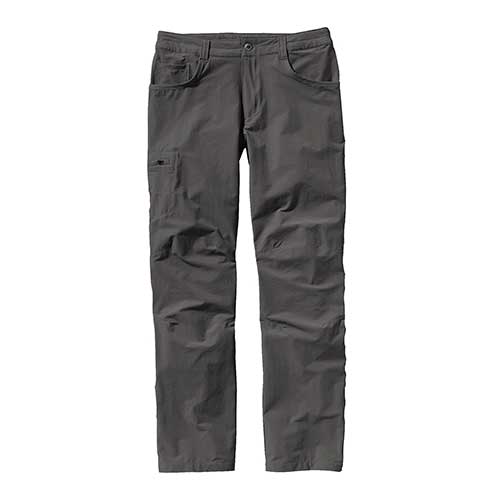
شلوار
She was wearing dark blue trousers and a white sweater.
او یک شلوار سرمه ای و ژاکت سفید پوشیده بود.
a piece of clothing that covers the lower half of your body, with a separate part fitting over each leg SYN pants American English
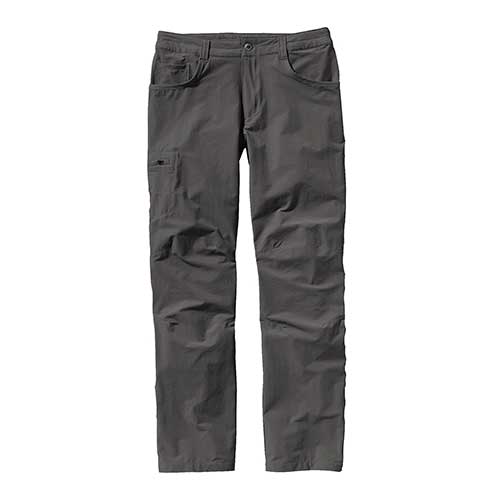
شلوار
She was wearing dark blue trousers and a white sweater.
او یک شلوار سرمه ای و ژاکت سفید پوشیده بود.
trousers
(British) (American pants) noun (plural)
a piece of clothing for your legs and the lower part of your body:
Your trousers are on the chair.
grammar
Be careful! You cannot say 'a trousers'. You can say a pair of trousers: I bought a new pair of trousers or: I bought some new trousers.
trousers
trou‧sers S2 /ˈtraʊzəz $ -ərz/ BrE AmE noun [plural] especially British English
[Date: 1600-1700; Origin: trouse 'trousers' (14-19 centuries), from Scottish Gaelic triubhas]
a piece of clothing that covers the lower half of your body, with a separate part fitting over each leg SYN pants American English:
His trousers were slightly too short.
I need a new pair of trousers for work.
—trouser adjective [only before noun]:
The tickets are in my trouser pocket.
⇨ wear the trousers at ↑wear1(7), ⇨ catch somebody with their trousers down at ↑catch1(6)
trousers
trou·sers [ˈtraʊzəz] [ˈtraʊzərz] (especially BrE) (NAmE usually pants) noun
plural
a piece of clothing that covers the body from the waist down and is divided into two parts to cover each leg separately
• a pair of grey trousers
• I was still in short trousers (= still only a boy) at the time.
• He dropped his trousers.
see catch sb with their trousers down at catch v., wear the trousers at wear v.
Derived Word: trouser
See also: pants
Word Origin:
[trouser trousers] early 17th cent.: from archaic trouse (singular) from Irish triús and Scottish Gaelic triubhas (see trews), on the pattern of drawers.
Example Bank:
• He disapproves of women in trousers.
• He dropped his trousers in a rude gesture.
• He quickly pulled on his trousers and a T-shirt.
• I was still in short trousers at the time.
• I was still in short trousers= still only a boy at the time.
Cambridge Advanced Learner's Dictionary - 4th Edition
trousers / ˈtraʊ.zəz / / -zɚz / noun [ plural ] ( US Usually pants )
A1 a piece of clothing that covers the lower part of the body from the waist to the feet, consisting of two cylinder-shaped parts, one for each leg, that are joined at the top:
I need a new pair of trousers to go with this jacket.
Why aren't you wearing any trousers, David?
© Cambridge University Press 2013
trousers
/traʊzə(r)z/
Note: The form 'trouser' is used as a modifier.
1.
Trousers are a piece of clothing that you wear over your body from the waist downwards, and that cover each leg separately. (mainly BRIT; in AM, usually use pants)
He was smartly dressed in a shirt, dark trousers and boots...
Alexander rolled up his trouser legs.
N-PLURAL: also a pair of N
2.
to wear the trousers: see wear
trousers
trou·sers /ˈtraʊzɚz/ noun [plural] : pants 1
all mouth and no trousers
- see 1mouth
wear the trousers
- see 1wear
with your trousers down Brit informal : in an embarrassing situation
• another CEO caught with his trousers down [=(US) with his pants down]
- trou·ser /ˈtraʊzɚ/ adj always used before a noun
• a trouser leg
a shirt for women
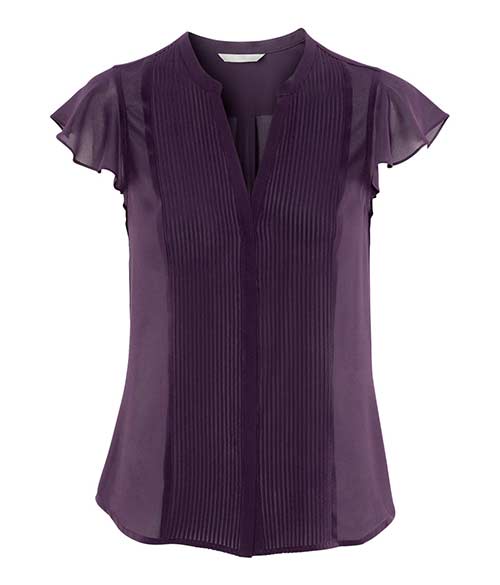
بلوز، پيراهن زنانه
a white blouse
بلوز سفید
a shirt for women
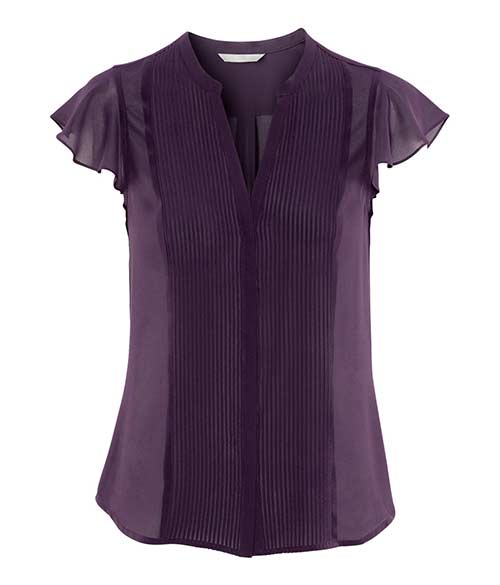
بلوز، پيراهن زنانه
a white blouse
بلوز سفید
blouse
noun
a piece of clothing like a shirt that a woman or girl wears on the top part of her body
blouse
blouse /blaʊz $ blaʊs/ BrE AmE noun [countable]
[Date: 1800-1900; Language: French]
a shirt for women:
a silk blouse
blouse
blouse [blouse blouses bloused blousing] [blaʊz] [blaʊs] noun
a piece of clothing like a shirt, worn by women
see a big girl's blouse at big adj.
Word Origin:
early 19th cent. (denoting a belted loose garment worn by peasants): from French, of unknown origin.
Cambridge Advanced Learner's Dictionary - 4th Edition
blouse / blaʊz / / blaʊs / noun [ C ]
blouse
A1 a shirt for a woman or girl:
a white silk blouse
© Cambridge University Press 2013
blouse
/blaʊz, AM blaʊs/
(blouses)
A blouse is a kind of shirt worn by a girl or woman.
N-COUNT
blouse
blouse /ˈblaʊs/ noun, pl blous·es /ˈblaʊsəz/ [count] : an often somewhat formal shirt for women and girls
• She wore a blouse and a skirt to work.
a set of clothes made of the same material, usually including a jacket with trousers or a skirt
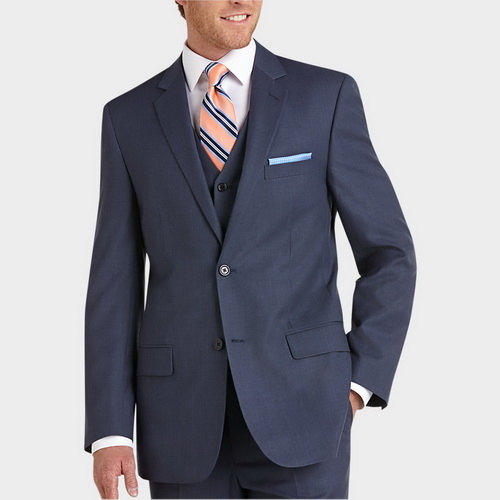
كت و شلوار، پيراهن و دامن
It's regulation to wear suits at the office.
پوشیدت کت و شلوار در دفتر مرسوم است.
a set of clothes made of the same material, usually including a jacket with trousers or a skirt
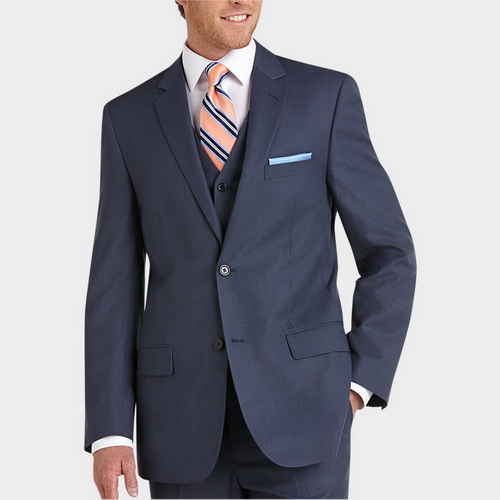
كت و شلوار، پيراهن و دامن
It's regulation to wear suits at the office.
پوشیدت کت و شلوار در دفتر مرسوم است.
noun
pronunciation
The word suit sounds like boot.
1 a jacket and trousers, or a jacket and skirt, that you wear together and that are made from the same material
2 one of the 4 sets that playing cards (= cards with numbers and pictures on them that you use for playing games) are divided into:
The four suits are hearts, clubs, diamonds and spades.
suit
I. suit1 S2 W3 /suːt, sjuːt $ suːt/ BrE AmE noun [countable]
[Date: 1200-1300; Language: Old French; Origin: siute 'act of following, group of helpers', from Vulgar Latin sequita, from sequere; ⇨ ↑sue]
1. CLOTHES a set of clothes made of the same material, usually including a jacket with trousers or a skirt:
a grey lightweight suit
a business suit
a tweed suit
She was wearing a black trouser suit. ⇨ ↑morning suit
2. bathing/jogging etc suit a piece of clothing or a set of clothes used for swimming, running etc ⇨ ↑boiler suit, ↑shell suit, ↑sweat suit, ↑tracksuit, ↑wet suit
3. LAW a problem or complaint that a person or company brings to a court of law to be settled SYN lawsuit:
Johnson has filed suit against her.
a civil suit
4. OFFICE WORKER informal a man, especially a manager, who works in an office and who has to wear a suit when he is at work:
I bought myself a mobile phone and joined the other suits on the train to the City.
5. CARDS one of the four types of cards in a set of playing cards
6. sb’s strong suit something that you are good at:
Sympathy is not Jack’s strong suit.
⇨ in your birthday suit at ↑birthday(3), ⇨ follow suit at ↑follow(14)
suit
suit [suit suits suited suiting] noun, verb [suːt] [sjuːt] [suːt]
noun
1. a set of clothes made of the same cloth, including a jacket and trousers/pants or a skirt
• a business suit
• a pinstripe suit
• a two-/three-piece suit (= of two/three pieces of clothing)
see also dinner suit, jumpsuit, leisure suit, lounge suit, sailor suit, shell suit, sweatsuit, tracksuit, trouser suit
2. a set of clothing worn for a particular activity
• a diving suit
• a suit of armour
see also boiler suit, spacesuit, swimsuit, wetsuit
3. any of the four sets that form a pack of cards
• The suits are called hearts, clubs, diamonds and spades.
4. = lawsuit
• to file/bring a suit against sb
• a divorce suit
see also paternity suit
5. usually plural (informal) a person with an important job as a manager in a company or organization, especially one thought of as being mainly concerned with financial matters or as having a lot of influence
• We can leave the detailed negotiations to the suits.
• He's a ‘suit’, not a ‘creative’.
see in your birthday suit at birthday, follow suit at follow, be sb's strong suit at strong
Word Origin:
Middle English: from Anglo-Norman French siwte, from a feminine past participle of a Romance verb based on Latin sequi ‘follow’. Early senses included ‘attendance at a court’ and ‘legal process’; senses 1 to 3 derive from an earlier meaning ‘set of things to be used together’. The verb sense ‘make appropriate’ dates from the late 16th cent.
Example Bank:
• All the cards have to be from the same suit.
• He wore his one good suit to the interview.
• His parents had bought him a new suit of clothes for the occasion.
• She plans to defend the suit vigorously.
• The cavalry wore a suit of light armour and carried a shield.
• The company now faces several suits over its failure to protect its employees.
• The suit changed to diamonds.
• The two companies have settled the suit.
• They have agreed to drop their suit against the Dutch company.
• They won't let you into the restaurant without a suit and tie.
• Two men in suits came out of the hotel.
• We bought the baby a couple of suits of clothes.
• Which suit is trumps?
• a suit against her former husband
• a suit over a disputed estate
• His former business associate filed a suit against him claiming £5 million damages.
• Their arguments grew worse and worse and ended with a divorce suit.
Idioms: suit somebody down to the ground ▪ suit your book ▪ suit yourself
Derived: suit something to somebody
Cambridge Advanced Learner's Dictionary - 4th Edition
suit / suːt / / sjuːt / / suːt / noun (SET OF CLOTHES)
A2 [ C ] a jacket and trousers or a jacket and skirt that are made from the same material:
All the businessmen were wearing pinstripe suits.
She wore a dark blue suit.
[ C ] a set of clothes or a piece of clothing to be worn in a particular situation or while doing a particular activity:
a diving/protective/ski, etc. suit
a swimsuit
a spacesuit
a suit of armour
suit / suːt / / sjuːt / / suːt / noun [ C ] ( also lawsuit ) (LEGAL PROBLEM)
a problem taken to a law court by an ordinary person or an organization rather than the police in order to obtain a legal decision:
He brought ( US usually filed ) a $12 million libel suit against the newspaper, claiming his reputation had been damaged.
a malpractice/negligence/paternity suit
suit / suːt / / sjuːt / / suːt / noun [ C ] (PLAYING CARDS)
any of the four types of card in a set of playing cards, each having a different shape printed on it:
The four suits in a pack of cards are hearts, spades, clubs, and diamonds.
suit / suːt / / sjuːt / / suːt / noun [ C often plural ] informal disapproving (PERSON)
a man who works in an office and wears a suit, especially a man with a high position in a company who is considered not to have human feelings and good ideas
© Cambridge University Press 2013
suit
/su:t/
(suits, suiting, suited)
Frequency: The word is one of the 1500 most common words in English.
1.
A man’s suit consists of a jacket, trousers, and sometimes a waistcoat, all made from the same fabric.
...a dark pin-striped business suit.
...a smart suit and tie.
N-COUNT
2.
A woman’s suit consists of a jacket and skirt, or sometimes trousers, made from the same fabric.
I was wearing my tweed suit.
N-COUNT
3.
A particular type of suit is a piece of clothing that you wear for a particular activity.
...a completely revolutionary atmospheric diving suit.
N-COUNT: n N
4.
If something suits you, it is convenient for you or is the best thing for you in the circumstances.
They will only release information if it suits them...
They should be able to find you the best package to suit your needs.
VERB: no cont, V n, V n
5.
If something suits you, you like it.
I don’t think a sedentary life would altogether suit me.
VERB: no cont, V n
6.
If a piece of clothing or a particular style or colour suits you, it makes you look attractive.
Green suits you.
VERB: no cont, V n
7.
If you suit yourself, you do something just because you want to do it, without bothering to consider other people.
These large institutions make–and change–the rules to suit themselves...
He made a dismissive gesture. ‘Suit yourself.’
= please
VERB: V pron-refl, V pron-refl
8.
In a court of law, a suit is a case in which someone tries to get a legal decision against a person or company, often so that the person or company will have to pay them money for having done something wrong to them.
Up to 2,000 former employees have filed personal injury suits against the company...
= lawsuit
N-COUNT
•
In American English, you can say that someone files or brings suit against another person.
One insurance company has already filed suit against the city of Chicago.
N-UNCOUNT
9.
A suit is one of the four types of card in a set of playing cards. These are hearts, diamonds, clubs, and spades.
N-COUNT
10.
see also bathing suit, birthday suit, boiler suit, trouser suit
11.
If people follow suit, they do the same thing that someone else has just done.
Efforts to persuade the remainder to follow suit have continued.
PHRASE: V inflects
1suit /ˈsuːt/ noun, pl suits
1 [count] : a set of clothes that usually consists of a jacket and a skirt or pair of pants that are made out of the same material
• a tweed/wool suit
• He wore his gray suit to the job interview.
- see color picture
- see also business suit, leisure suit, lounge suit, pantsuit, sailor suit, shell suit, three-piece suit, trouser suit, two-piece suit, zoot suit
2 [count] : a set of clothes or protective covering that is worn for a special purpose or under particular conditions
• a gym suit
• a suit of armor
- see also bathing suit, bodysuit, catsuit, jumpsuit, snowsuit, space suit, sweat suit, swimsuit, union suit, wet suit
3 : a process by which a court of law makes a decision to settle a disagreement or problem between people or organizations : lawsuit
[count]
• a civil/criminal suit
• divorce/custody/paternity suits
• He filed/brought a suit [=started legal proceedings] against her.
[noncount]
• He filed/brought suit [=started legal proceedings] against her.
4 [count] : all the cards that have the same symbol in a pack of playing cards
• The trump suit is hearts/clubs/diamonds/spades.
5 [count] informal + disapproving : a person who has an important job in an office and who wears a suit : a business executive
• She described her boss as “an empty suit.” [=a stupid and ineffective businessman]
- usually plural
• Get back to work. The suits just walked in.
birthday suit
- see birthday
follow suit
a piece of clothing worn by a woman or girl that covers the top of her body and part or all of her legs
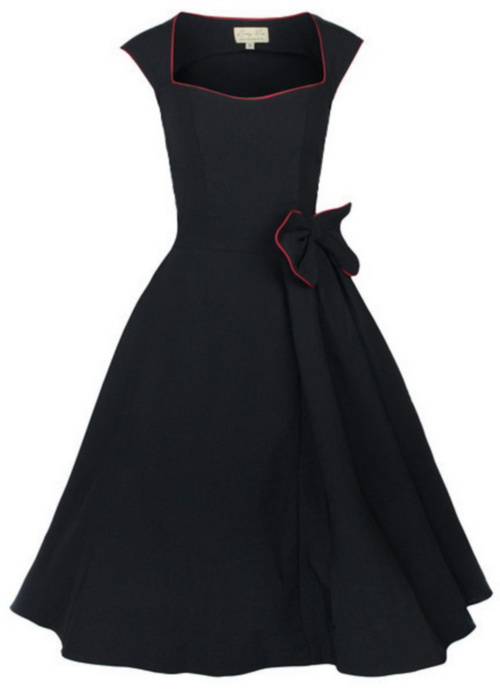
(زنانه) پيراهن، لباس يك تكه
She was wearing exactly the same dress as I was.
او دقیقا همان لباسی را پوشیده بود که من پوشیده بودم.
a piece of clothing worn by a woman or girl that covers the top of her body and part or all of her legs
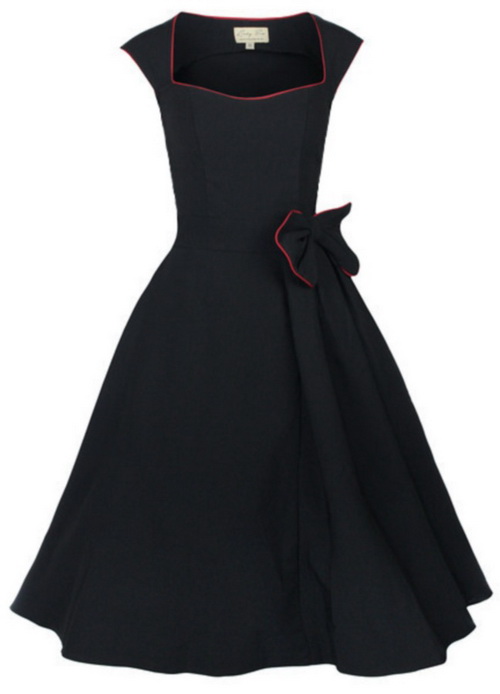
(زنانه) پيراهن، لباس يك تكه
She was wearing exactly the same dress as I was.
او دقیقا همان لباسی را پوشیده بود که من پوشیده بودم.
noun
1 (plural dresses) a piece of clothing with a top part and a skirt, that a woman or girl wears
2 (no plural) clothes:
The group of dancers wore Bulgarian national dress.
dress
I. dress1 S2 W2 /dres/ BrE AmE noun
[Word Family: noun: ↑dress, ↑dresser, ↑dressing; adjective: ↑dressed ≠ ↑undressed, ↑dressy; verb: ↑dress ≠ ↑undress]
1. [countable] a piece of clothing worn by a woman or girl that covers the top of her body and part or all of her legs ⇨ skirt:
Sheila wore a long red dress.
a summer dress
2. [uncountable] clothes for men or women of a particular type or for a particular occasion:
a gentleman in evening dress (=formal clothes worn especially at important social events)
The play was performed in modern dress (=clothes from the present time).
dress code (=a standard of what you should wear for a particular situation)
This restaurant has a strict dress code – no tie, no service.
• • •
COLLOCATIONS
■ ADJECTIVES/NOUN + dress
▪ a wedding dress Have you chosen your wedding dress yet?
▪ an evening dress (=a formal dress to wear in the evening) She arrived in a red evening dress.
▪ a cocktail dress (=a formal dress but not usually a long one) She wore a little black cocktail dress.
▪ a silk/cotton/velvet etc dress Ellie chose a green silk dress.
▪ a long dress (=that goes down to your ankles) Most of the women were wearing long dresses.
▪ a party dress (=for parties) I need a new party dress for Christmas.
▪ a summer dress a cool blue summer dress
▪ a strapless dress (=that does not have straps on your shoulders) She was wearing a strapless cream dress and matching shoes.
▪ a sleeveless dress (=without any sleeves) She was photographed wearing a figure-hugging sleeveless dress.
■ dress + NOUN
▪ a dress shop (=selling women’s dresses and other clothes) It was an expensive dress shop.
▪ a dress designer (=someone whose job is designing women’s clothes) She’s a former royal dress designer.
• • •
THESAURUS
▪ clothes noun [plural] things you wear to cover your body or keep you warm. Clothes is always plural: I like your clothes! | Don’t throw your dirty clothes on the floor! | a clothes shop
▪ clothing noun [uncountable] used when talking in general about a type of clothes, or about making or selling clothes. Also used in the phrase a piece/item/article of clothing (=one of the things that someone wears): You’ll need to take some warm clothing. | It is important to wear protective clothing at all times. | a clothing manufacturer | a clothing retailer | Police found a piece of clothing in the bushes. | I took a change of clothing with me.
▪ garment noun [countable] formal one thing that you wear. Also used when talking about buying and selling clothes: a long velvet garment | the garment industry | garment workers | garment factories
▪ dress noun [uncountable] a particular style of clothes. Don’t use dress on its own: Casual dress is not appropriate for an interview. | men in evening dress
▪ wear noun [uncountable] used about types of clothes sold in a shop, in the following phrases. Don’t use wear on its own: children’s wear | sports wear | casual wear
▪ gear noun [uncountable] /ɡɪə $ ɡɪr/ informal clothes for a particular sport or activity: She was wearing her running gear. | Have you got all your gear?
▪ wardrobe noun [singular] all the clothes that you own, or all the clothes that you wear at a particular time of year: Her wardrobe consisted mainly of smart clothes for work. | I will need a new summer weardrobe. | You could win a complete new wardrobe!
dress
dress [dress dresses dressed dressing] noun, verb [dres] [dres]
noun
CLOTHES
1. countable a piece of women's clothing that is made in one piece and covers the body down to the legs, sometimes reaching to below the knees, or to the ankles
• a long white dress
• a wedding dress
see also cocktail dress, evening dress, sundress
2. uncountable clothes for either men or women
• to wear casual/formal dress
• He has no dress sense (= no idea of how to dress well).
see also evening dress, fancy dress, headdress, morning dress
Word Origin:
Middle English (in the sense ‘put straight’): from Old French dresser ‘arrange, prepare’, based on Latin directus ‘direct, straight’.
Thesaurus:
dress noun U
• All the guests were in evening dress.
clothes • • clothing • • costume • • wear • • wardrobe • |AmE apparel • |informal gear • |formal garment •
casual dress/clothes/clothing/apparel/wear/gear
evening/formal dress/clothes/wear
wear …dress/clothes/costume/gear/garments
Example Bank:
• He was wearing traditional Scottish dress.
• He's got poor dress sense.
• She appeared in a slinky satin dress.
• She hitched up her long dress so it wouldn't drag in the mud.
• She looked elegant in a simple black dress.
• She sat down and smoothed her dress over her legs.
• The club has a strict dress code.
• The hat went with her new dress wonderfully.
• a performance of ‘Hamlet’ in modern dress
• in full dress uniform
• the costumes worn at the fancy-dress ball
• All the guests were in evening dress.
• Everyone was expected to wear fancy dress.
• He has no dress sense.
• The company has a strict dress code — all male employees are expected to wear suits.
• We were allowed to wear casual dress on Fridays.
Cambridge Advanced Learner's Dictionary - 4th Edition
dress / dres / noun
A1 [ C ] a piece of clothing for women or girls that covers the top half of the body and hangs down over the legs:
a long/short dress
a wedding dress
B2 [ U ] used, especially in combination, to refer to clothes of a particular type, especially those worn in particular situations:
The queen, in full ceremonial dress, presided over the ceremony.
© Cambridge University Press 2013
dress
/dres/
(dresses, dressing, dressed)
Frequency: The word is one of the 1500 most common words in English.
1.
A dress is a piece of clothing worn by a woman or girl. It covers her body and part of her legs.
She was wearing a black dress.
N-COUNT
2.
You can refer to clothes worn by men or women as dress.
He’s usually smart in his dress.
...hundreds of Cambodians in traditional dress.
N-UNCOUNT
see also evening dress, fancy dress, full dress, morning dress
3.
When you dress or dress yourself, you put on clothes.
He told Sarah to wait while he dressed...
Sue had dressed herself neatly for work.
VERB: V, V pron-refl
4.
If you dress someone, for example a child, you put clothes on them.
She bathed her and dressed her in clean clothes.
VERB: V n
5.
If someone dresses in a particular way, they wear clothes of a particular style or colour.
He dresses in a way that lets everyone know he’s got authority...
VERB: V in n
6.
If you dress for something, you put on special clothes for it.
We don’t dress for dinner here.
VERB: V for n
7.
When someone dresses a wound, they clean it and cover it.
The poor child never cried or protested when I was dressing her wounds.
VERB: V n
8.
If you dress a salad, you cover it with a mixture of oil, vinegar, and herbs or flavourings.
Scatter the tomato over, then dress the salad.
...a bowl of dressed salad.
VERB: V n, V-ed
2dress noun, pl dresses
1 [count] : a piece of clothing for a woman or a girl that has a top part that covers the upper body and a skirt that hangs down to cover the legs
• She wore dresses only on special occasions.
• She wore a short/long black dress to the party.
• Her wedding dress was decorated with lace.
2 [noncount] : a particular type of clothing
• The guests were clothed in traditional Indian dress.
• It is wise to wear conservative dress to an interview.
